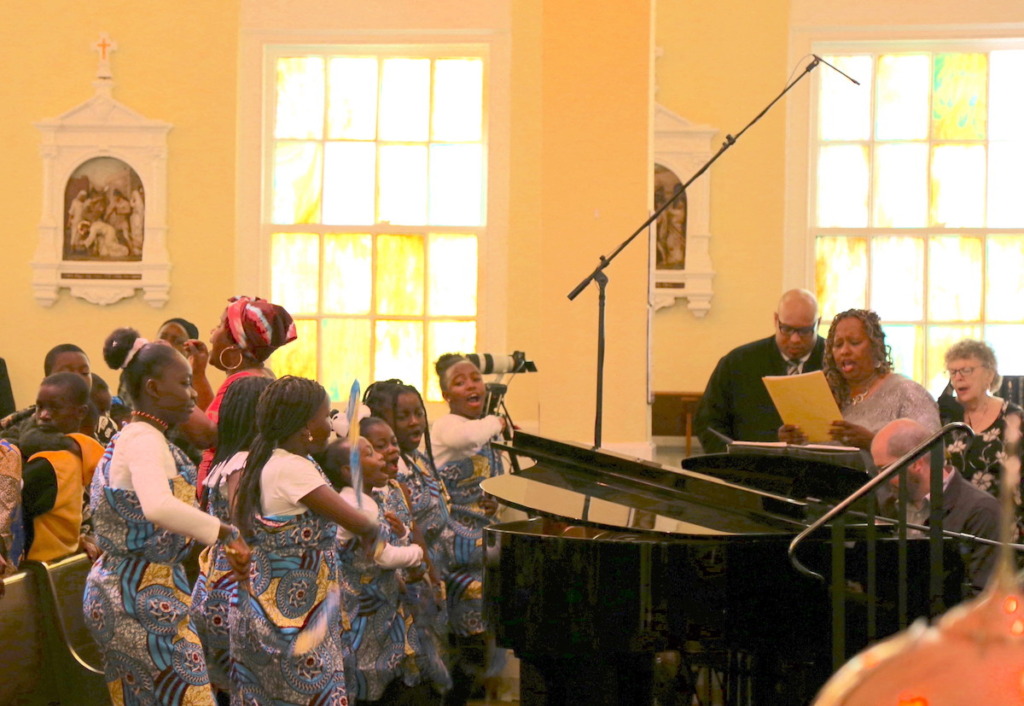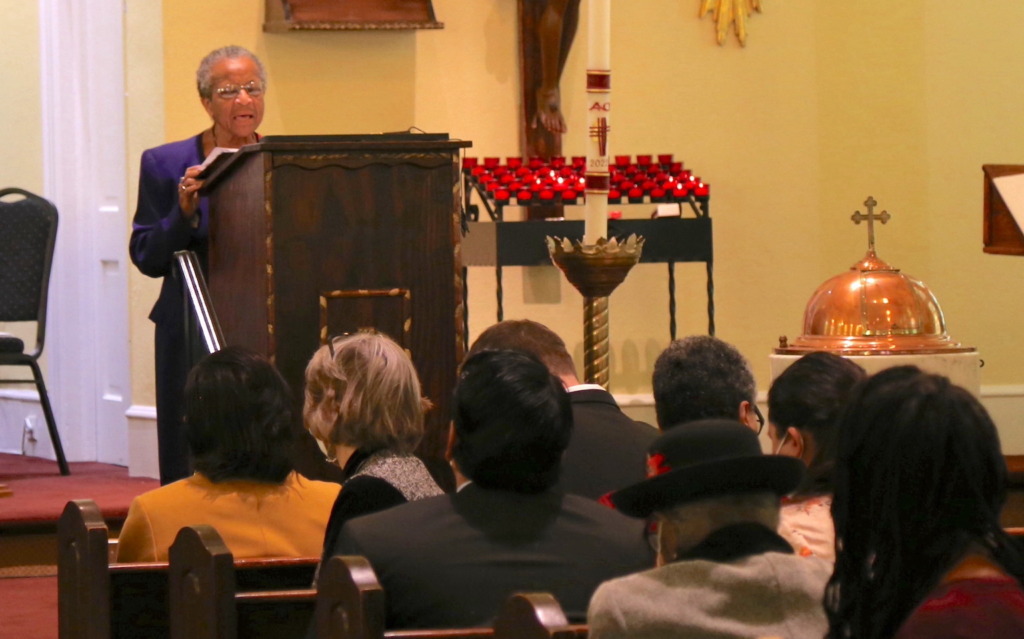‘The future is bright’ for growing St. Elizabeth community
For a nearly a century, St. Elizabeth, Richmond, has welcomed people from all walks of life through its doors. The parish will officially mark its 100th anniversary in July 2023, but the celebration has already begun.
Surrounded by the sounds of Swahili worship songs, St. Elizabeth kicked off its year-long centennial celebration on Sunday, Nov. 20, 2022, with a Mass at which Bishop Barry C. Knestout was the principal celebrant. Concelebrating were current pastor Father James Arsenault, former pastors Msgr. Walter Barrett, Msgr. Michael Schmied and Father Daniel Brady, and Msgr. William Carr.
“Today we celebrate the work, life and activity of the parish community that has facilitated the faith of generations in the past and continues to do so now and into the future,” Bishop Knestout said in his homily.
The bishop also blessed the newly restored stained glass window depicting St. Elizabeth of Hungary, which was made possible by funds provided by the diocesan Office of Archives.
Humble beginnings
In the 1920s, immigrant families with roots in Italy, Germany and Poland worked together to start a Catholic parish in Highland Park. Worshippers first met on the bottom floor of a former residence that was converted into a chapel, with the pastor living on the second floor.
In early 1925, the church was built on a donated lot at the corner of Second Avenue and Fourqurean Lane. The first Mass in the new church was celebrated on Christmas Day of the same year.
From its humble beginnings, St. Elizabeth grew and changed over the next several decades.
According to the parish’s centennial celebration booklet, St. Elizabeth became more racially and economically diverse in the 1950s and 1960s as many white parishioners left for the suburbs, and more Black families moved into the neighborhood. Many new parishioners came from St. Joseph Parish after it closed in 1969. St Elizabeth became part of the Diocese of Richmond’s refugee resettlement program in the early 1980s and welcomed families from Vietnam, Cuba and Ethiopia. Today, families from Africa also help fill the church’s pews, worshipping alongside Asian, Latino and white parishioners.
Years without a pastor
The 1980s and 1990s saw a sharp decline in vocations across the country, and for many years, St. Elizabeth was left without a resident pastor. Bishop Walter F. Sullivan appointed Sister of Mercy Cora Marie Billings, who has been a member of the parish since 1981, as pastoral coordinator to serve the parish.
She was the first African American woman in the United States to serve in this role, which she held from 1990-2004. She concurrently served as the head of the diocesan Office for Black Catholics, a post she held for 25 years.
“I did everything that a pastor would be doing,” Sister Billings said. “I took care of the spiritual, corporal and financial aspects of the parish. I was responsible for everything.”

She also led services, scheduled visiting priests, helped with fundraising efforts, participated in outreach programs and more.
Of the parish she said, “It’s one that is welcoming, one that is a community that is open-minded, one that can many times look beyond what’s there and fulfill the hopes and vision of something even better than what it is.”
Rich in diversity
The parish’s motto, “Umoja,” or “unity” in Swahili, was adopted in the late 1970s.
The parish has a ministry of the same name in which refugees are provided with financial assistance, transportation, job training, help with education and literacy and more. Refugee children with gaps in their education are offered a unique weekend and summer school program to help them catch up in math and reading. Older students receive help earning their GEDs. Many participants remain active in the parish and help in welcoming new refugees.
St. Elizabeth is also partnering with Commonwealth Catholic Charities to help provide affordable housing to struggling parishioners.
“All these little stories that are happening here are just kind of amazing,” said Father Arsenault, who has spent the past decade at St. Elizabeth.
The priest credits the parishioners for the longevity of the parish. He sees the influx of African immigrants as a major reason why the parish population has doubled in size over the last five years and has enjoyed incorporating some of their culture into Mass. He’s even trying to learn Swahili.
“I believe the future is bright because we have a community who is growing, especially with young people, from African countries and locally, both Black and white,” he said. “Where in the past there was a racial tension, I don’t see young people and millennials having that same concern.”
The parish offers a series of “Conversations on Racism” that began after the murder of George Floyd in 2020. The church invited its members, including teenagers, to attend and participate in conversations in an effort to better understand how racism materializes.
“Racism is still a major part of our society, that’s why we are working on it,” said Sister Billings. “If we continue to deny it, then it never gets eradicated. If I am not a part of helping to change it, then I’m going to continue to be a problem and not become a solution to the problem.”
“Combatting racism is a daily intentional thing,” she said.
Through the parish’s many social justice programs, she sees hope for the future as long as people are willing to work together for lasting change.
“People are interested and trying to be the disciples that Jesus wanted us to be. They are looking for the ways to do that and not just sitting back,” she said.
‘Stronger than ever’
Larry Williford has attended St. Elizabeth since 1972 but didn’t convert to Catholicism until 10 years later. Like his children, he was baptized, confirmed and received first Eucharist at St. Elizabeth. Williford said he and his wife, a white Catholic, found their place here after visiting several different churches.
“It just felt like home,” he said. “We were welcomed there as a mixed couple. There was no tension, no barriers.”
Over the years, Williford has served the parish in multiple capacities. He has been a lector and eucharistic minister; has sung in the choir and served on the parish council. He has also been president of the church’s men’s group. In the 1980s, he helped relocate refugee families and is now teaching younger members of the parish to do the same.
“We just try to praise the Lord. That’s all we do. And help others do the same,” he said.
Many milestones of Mary Ann Allen’s life have taken place at St. Elizabeth. A member for 86 years, Allen is the parish’s longest parishioner.
Born in 1936, she was baptized at the parish. She remembers celebrating Midnight Mass and walking in May processions as a child, carrying a bouquet of flowers just as she would years later when she and her husband were married.
“I love this parish,” she said. “We have been through a lot over the years. Integrating the neighborhood and parish was difficult and we lost a number of white parishioners. However, we gained so much more.”
Allen said parishioners had, at times, been worried that St. Elizabeth would be closed due to many hardships.
“But we have survived and are stronger than ever,” she said.
Editor’s note: More information about St. Elizabeth’s centennial celebration, including a calendar of events, can be found at https://stelizcc.org.

